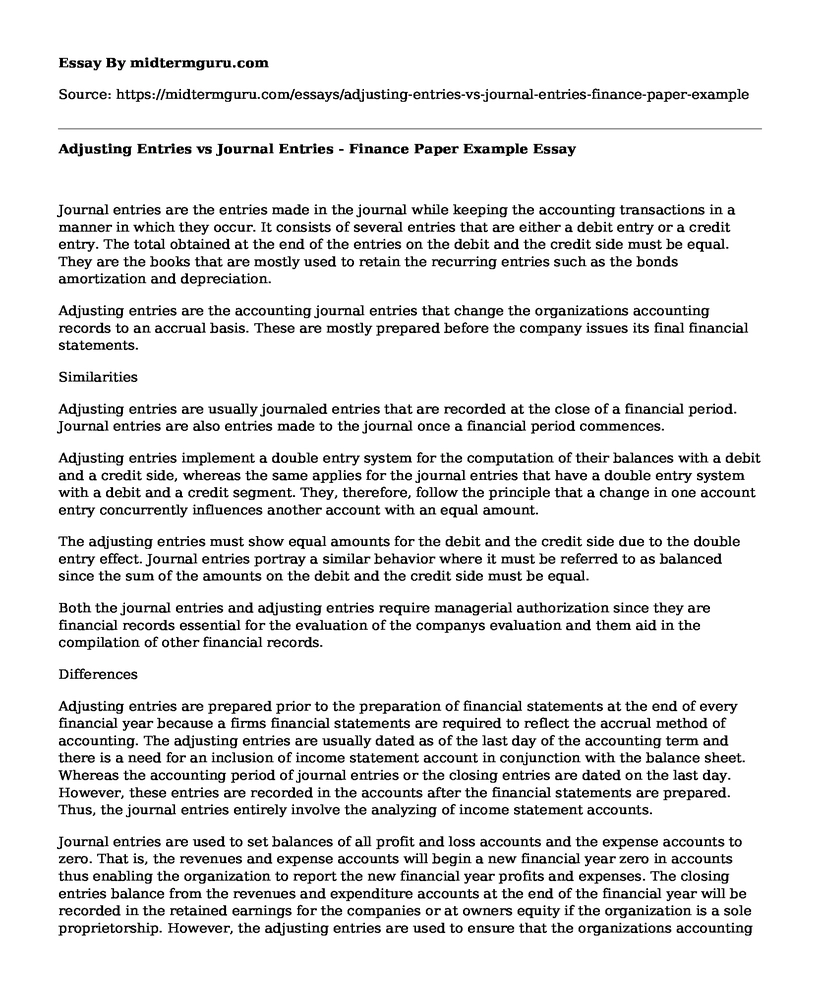Journal entries are the entries made in the journal while keeping the accounting transactions in a manner in which they occur. It consists of several entries that are either a debit entry or a credit entry. The total obtained at the end of the entries on the debit and the credit side must be equal. They are the books that are mostly used to retain the recurring entries such as the bonds amortization and depreciation.
Adjusting entries are the accounting journal entries that change the organizations accounting records to an accrual basis. These are mostly prepared before the company issues its final financial statements.
Similarities
Adjusting entries are usually journaled entries that are recorded at the close of a financial period. Journal entries are also entries made to the journal once a financial period commences.
Adjusting entries implement a double entry system for the computation of their balances with a debit and a credit side, whereas the same applies for the journal entries that have a double entry system with a debit and a credit segment. They, therefore, follow the principle that a change in one account entry concurrently influences another account with an equal amount.
The adjusting entries must show equal amounts for the debit and the credit side due to the double entry effect. Journal entries portray a similar behavior where it must be referred to as balanced since the sum of the amounts on the debit and the credit side must be equal.
Both the journal entries and adjusting entries require managerial authorization since they are financial records essential for the evaluation of the companys evaluation and them aid in the compilation of other financial records.
Differences
Adjusting entries are prepared prior to the preparation of financial statements at the end of every financial year because a firms financial statements are required to reflect the accrual method of accounting. The adjusting entries are usually dated as of the last day of the accounting term and there is a need for an inclusion of income statement account in conjunction with the balance sheet. Whereas the accounting period of journal entries or the closing entries are dated on the last day. However, these entries are recorded in the accounts after the financial statements are prepared. Thus, the journal entries entirely involve the analyzing of income statement accounts.
Journal entries are used to set balances of all profit and loss accounts and the expense accounts to zero. That is, the revenues and expense accounts will begin a new financial year zero in accounts thus enabling the organization to report the new financial year profits and expenses. The closing entries balance from the revenues and expenditure accounts at the end of the financial year will be recorded in the retained earnings for the companies or at owners equity if the organization is a sole proprietorship. However, the adjusting entries are used to ensure that the organizations accounting records and financial statements are accurate and conversant on the accrual basis of bookkeeping. The adjusting entries are used to record expenses such as wages and electricity bills in order for the company to keep track of expenses incurred before the end of financial year.
There is a contrast between the necessity of journal entries in accounting records and the necessity of adjusting entries in monitoring the accuracy of a financial statement. Adjusting entries are significantly used in accruing expenses and losses and other liabilities that are related. It also accrues the profits and revenues and other related assets, defers expenses and revenues as well as other related assets. Further, the adjusting entries account for depreciation expenditures and bad debts expenses and the alterations in the related contra asset account. On the other hand, the journal entries are necessitated for keeping a systematic record of the financial entries this is to ensure that the company keeps track of their daily transactions in the business operations. Additionally, the journal entries place the financial transactions in sequential order and thus it exhibits the required data about the financial entries. These closing entries are prepared to be used as a legal evidence of the financial transactions that took place within the financial year. Finally, the journal entries are prepared to enable the preparation of ledger book.
The adjustment entries are often divided into two sections accruals and deferrals- while the journal entries are not divided into segments. The accruals account for both revenues and expenditures and therefore are related to those expenses or revenue transactions that occurred within the financial year must be recorded to the current financial statement and balance sheet. The deferrals type of adjusting entries pertain the expenditures and profits; it provides for the account in which the records are entered for the transactions that require being divided in between two or more accounting periodic terms.
The Adjusting entries involve balance sheet account in terms of the prepaid insurance, debtors and interest payable as well as the income statement account on insurance expense and interest expense. On the other hand, the journal entry involves the entries of individual activities that contribute to the balance sheet such as the changes that result from the transactional culture of the business.
Cite this page
Adjusting Entries vs Journal Entries - Finance Paper Example. (2021, Jun 01). Retrieved from https://midtermguru.com/essays/adjusting-entries-vs-journal-entries-finance-paper-example
If you are the original author of this essay and no longer wish to have it published on the midtermguru.com website, please click below to request its removal:
- Choince of the Profession of an Accountant
- Adjusting Entries vs Journal Entries - Finance Paper Example
- Essay on Accounting and the Environment
- Accounting Report on PepsiCo and Coca Cola
- POS System: Streamlining Foodservice Businesses - Essay Sample
- Book Analysis Essay on Financial Statement Analysis
- Objectivity in Accounting: Evaluating Morgan's Argument - Essay Sample







